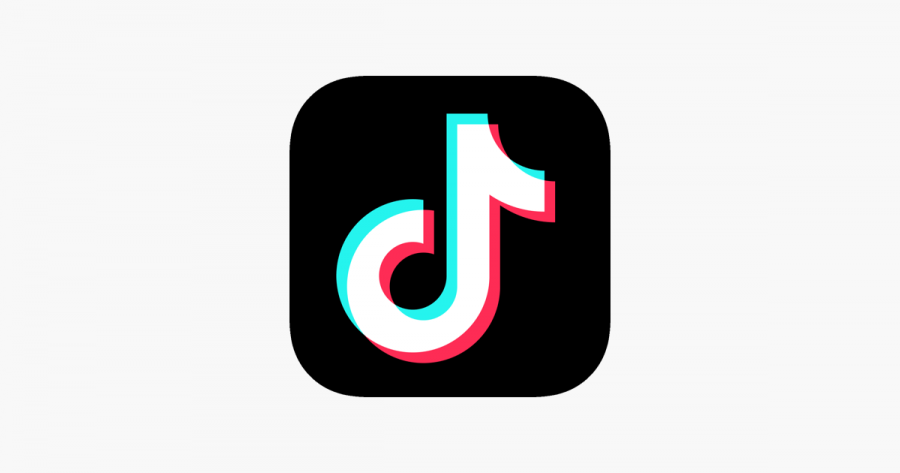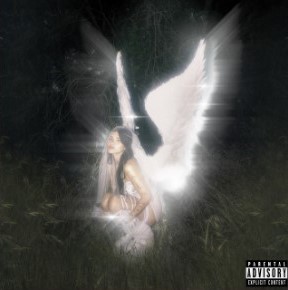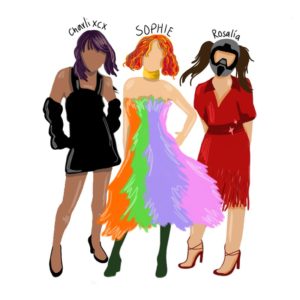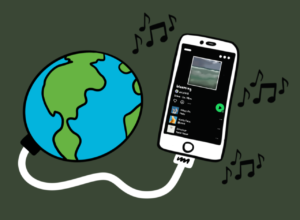15 seconds to fame: TikTok revolutionizing the music industry
Photo Credit: Logaster Blog
TikTok songs are ever-popular with the app growing, but it’s questionable whether their popularity reflects quality.
March 3, 2023
15 seconds is all it takes to launch a previously underground artist into stardom, to give them unmeasurable fame and recognition, to change their lives. 15 seconds is all it takes for a viewer to like a TikTok or share it with their friends, but for an artist, it can change their lives forever.
For many unknown musicians, this is a dream come true. Through TikTok, new artists have more accessibility to a successful music career than ever before, creating an impact that stretches across the entire music community.
One such artist is Gayle with her hit song, “abcdefu.” The song gained traction when a comment asked her to write a breakup song using the alphabet. However, this comment was not organically written by a fan but rather by her marketing manager. Her TikTok response to this comment became viral, allowing her to acquire more success, such as being nominated for the Grammys’ Song of the Year award and performing alongside Taylor Swift in her Eras Tour.
However, the song itself does not contain meaningful lyrics or incite an emotional response, both of which are characteristic of a good song. Gayle also released multiple versions of “abcdefu,” none of which were drastically different from the original. This blatant attempt to gain more streams made it even more obvious that the song was just a publicity stunt.
In addition, multiple versions of the song, which were not drastically different from the original, were released, increasing the song’s streams, but making it more obvious that it was all just a publicity stunt.
In a Business Insider article named “How TikTok is Changing the Music Industry,” Jesse Callahan, founder of a marketing firm, explained that TikTok is “a big way that labels have brought artists into the spotlight the last couple of years.”
Many singers get the chance to promote their music on TikTok, and large labels discover these artists and offer them contracts in return for creating a strong social media presence. In 2019, Australian singer and busker Inoxia went viral on Tik Tok when a stranger recorded her performance and uploaded it on the app. As a result, the singer received many amazing record deals, but was told that she should become more of an influencer in order to maintain her success. The artist, displeased with these deals, ultimately returned to busking; her passion was singing, not making videos.
Tiktok’s wave of influence has not only reached independent artists, but also record labels who are losing their tight control over the music industry. Established artists are increasingly pressured by their labels to create TikToks to promote their new songs, hoping for a trend. For example, alternative pop singer Halsey expressed how she dislikes the app due to the pressure that label pushes on her to get viral with a TikTok trend.
“Basically I have a song that I love that I wanna release ASAP, but my record label won’t let me,” Halsey said in a TikTok post. “My record company is saying that I can’t release it unless they can fake a viral moment on TikTok.”
In addition, when songs go viral on Tik Tok, artists are often forced to release them. Bebe Rexha and David Guetta’s song “I’m good (blue)” was originally never released until it became viral on Tik Tok. The track, based on Eiffel 65’s smash hit “Blue (Da ba dee),” was initially shelved during the time of its creation in 2017 because the artists believed that it wasn’t good enough. However, after the simple song was shared throughout Tik Tok, the artists revisited it and officially released it.
The idea of songs being resurrected on Tik Tok is not a new concept, and many singers reveal clips of their songs on tik tok before officially releasing them. By doing this, they build up excitement around the song, so when the song is officially released, it is guaranteed to garner attention even if it doesn’t sound good. Charlie Puth is an artist who used this method to build hype for his hit song “Light Switch.” By creating various tik toks ahead of time asking viewers to “imagine a song that sounded like this” or “what if we added a guitar to it?” This form of promotion allowed viewers to feel involved in the song’s production and when it was officially released, many were excited to listen to a song that they felt like they helped create.
Along with involving fans through the production process, labels use music marketing to sneak in a trendy dance or unique video that results in the song being played over and over again. Meghan Trainor’s new song “Made You Look” is a perfect example of this phenomenon.
Trainor was extremely well-known in the 2010s, but after multiple hits, her popularity waned. By connecting with TikToker dancers whose style seemed to fit Trainor’s music, Trainor and her team created a viral dance to help promote her newest song, successfully bringing her back into the spotlight. Artists and records create a new filter or easy-to-follow trend that pairs with a song as another way to increase the song’s success and streams.
However, songs that blow up on social media don’t necessarily represent the true talent of these artists. One such musician is Steve Lacy, who questioned during one of his recent concerts why fans stopped singing after the bridge of his viral song “Bad Habits.” The reason was that the audience did not know any of his other songs, and the majority of them only attended the concert to listen to him sing a snippet of his most popular song. As a result of occurrences like this, artists can lose enthusiasm in their songs and other real fans do not get a chance to see the artist or fully enjoy a concert that is too quiet.
15 seconds of a TikTok video cannot fully encapsulate the quality of a song or the musical flavor of an artist. The snippets of music that become viral are the “killing parts,” the sections of songs that are the most catchy and unique. These 15-second snippets are accompanied by either an accessible dance or a joke, leading to hundreds of versions of the same clips. TikTok music, or songs that artists try to create to blow up on TikTok, cannot represent the true opinions of the general public on the quality of a song, especially when most users haven’t even listened to the song in its entirety.
The fleeting trends and insured hits of the TikTok music industry have led to more artists gearing their music to obtain their 15 seconds of fame. Songs that are “made to go viral” are generally shorter, since these songs are catered to users that have short attention spans and lose their interest easily in videos. The music also breaks away from the traditional structure of pop songs, always missing post-choruses or bridges. While different song formats are not necessarily a bad thing on their own, in an attempt to make more experimental songs, music overall has become monotonous, treading through the same four chords and soulless lyrics.
At times, the mismatch between different elements of the songs are painfully obvious, with choruses standing out and verses having an unrelated melody, lyrics or meaning. In addition, with lyrics losing their relevance in music, the public seemingly takes more interest in repetitive melodies, even if the songs have nonsensical lyrics.
But Tik Tok isn’t a music streaming platform and doesn’t prioritize sharing different types of music. The app’s main goal is for users to create and share short videos. In Tik Tok, the trends and dances are endlessly repeated by users, but the users tend to disregard the song itself. For example, in 2020, the Renegade dance challenge became a viral sensation, with many Tik Tok influencers performing the trend. But despite the song in Renegade being used constantly in videos, almost no one knows the name of the song (Lottery by K-Camp) performed to.
The emergence of new technology has always been revolutionizing music. Streaming apps like Spotify and Pandora transformed the listening experience. Music competition shows, such as the X Factor and American Idol, gave birth to some of the biggest musicians of the 21st century. But the emergence of TikTok seems like a larger force in music, not only influencing the singers who become popular but also creating a shift in the music itself.
Right now, however, Tik Tok has helped shift the music industry from relying on radio play to online streaming, created a platform for everyone to share their talents and revolutionized the way that music is promoted. Every song that goes viral on Tik Tok, is now guaranteed to become award-winning, even if the song itself is not very good.







